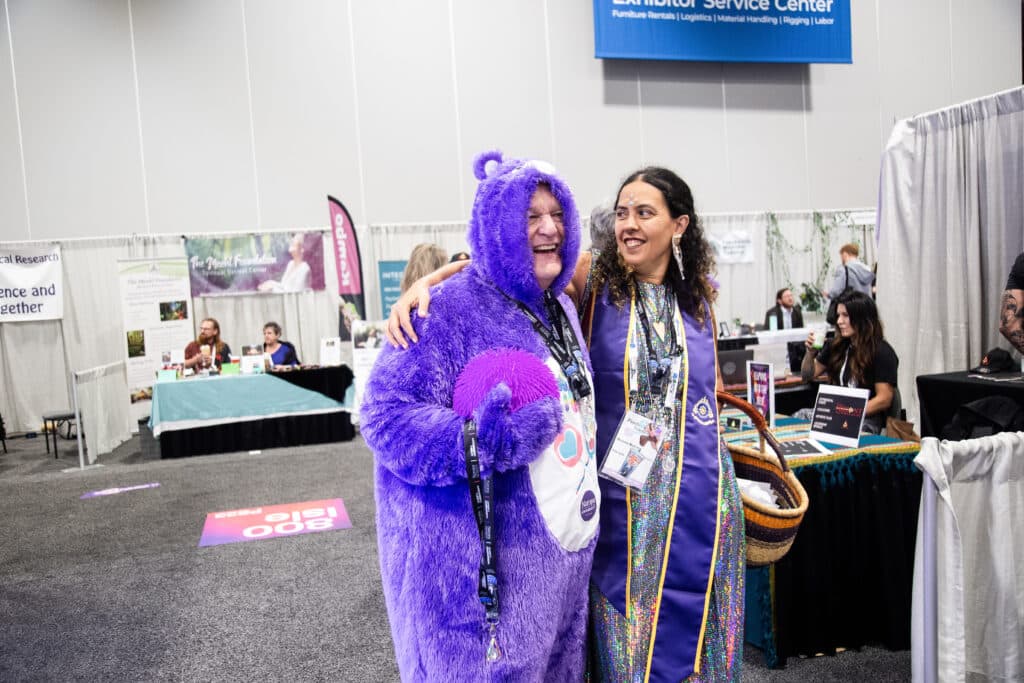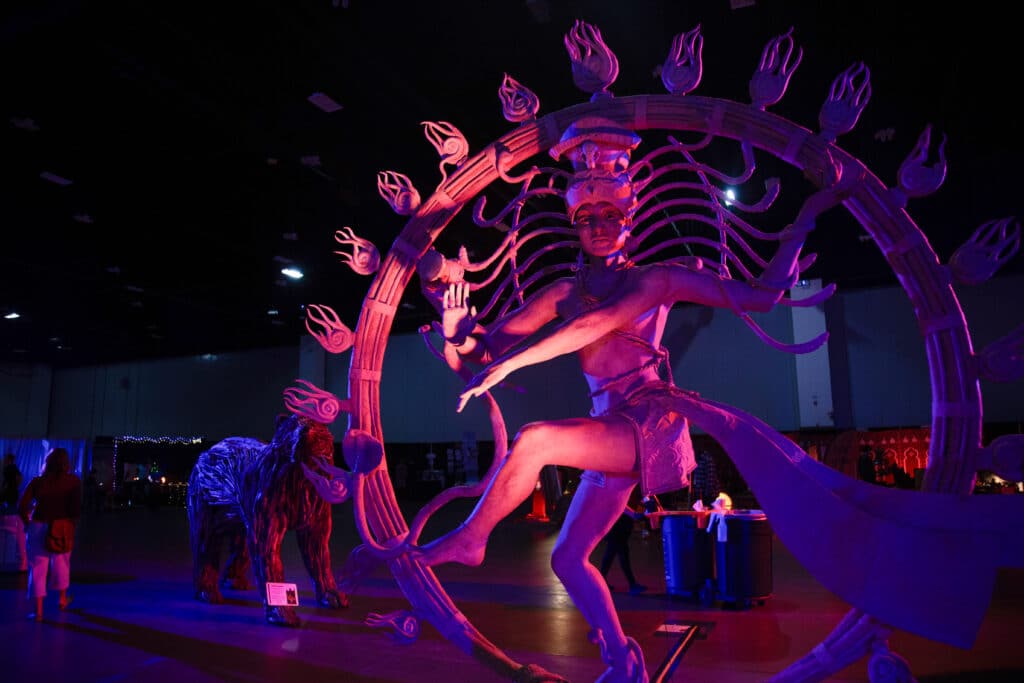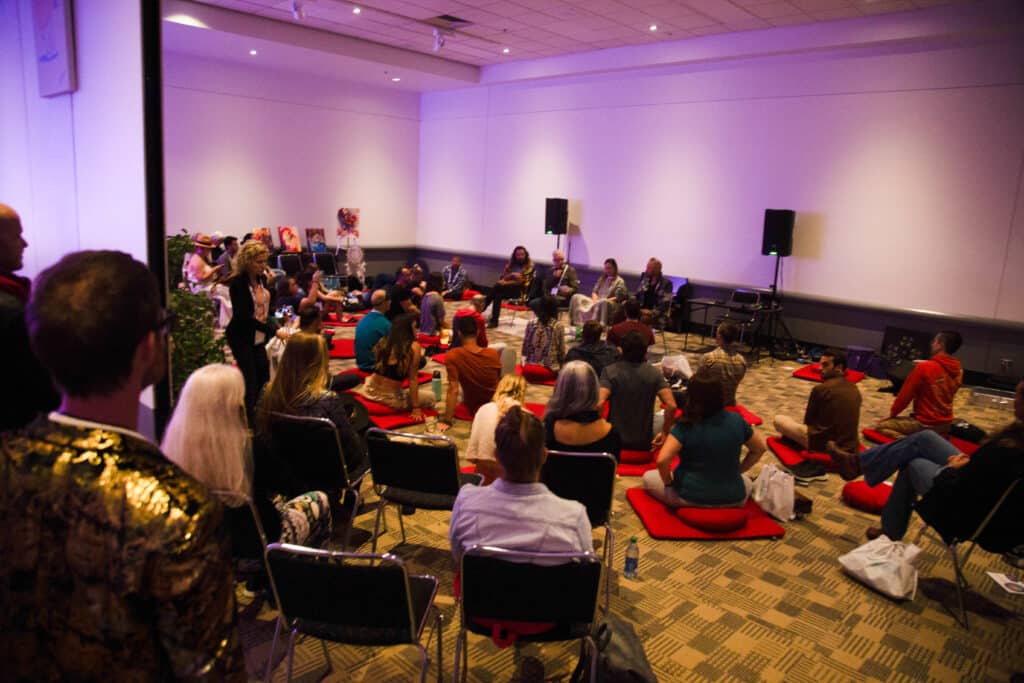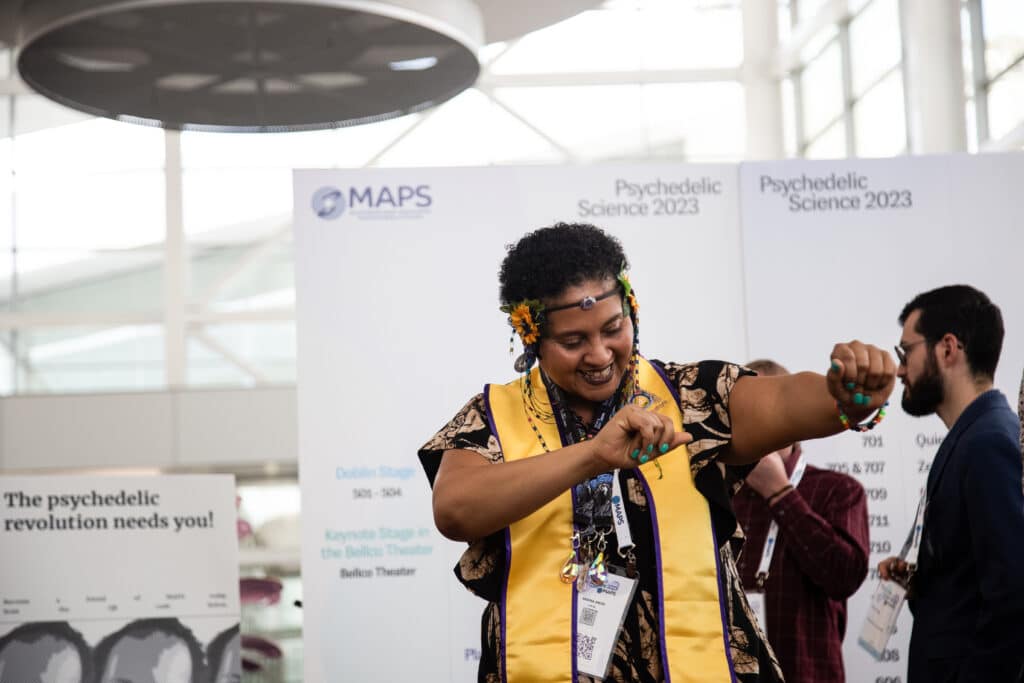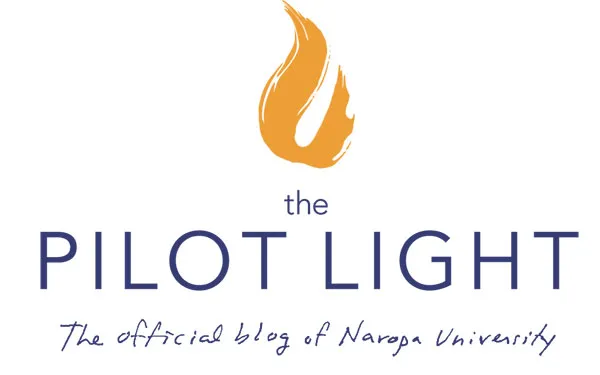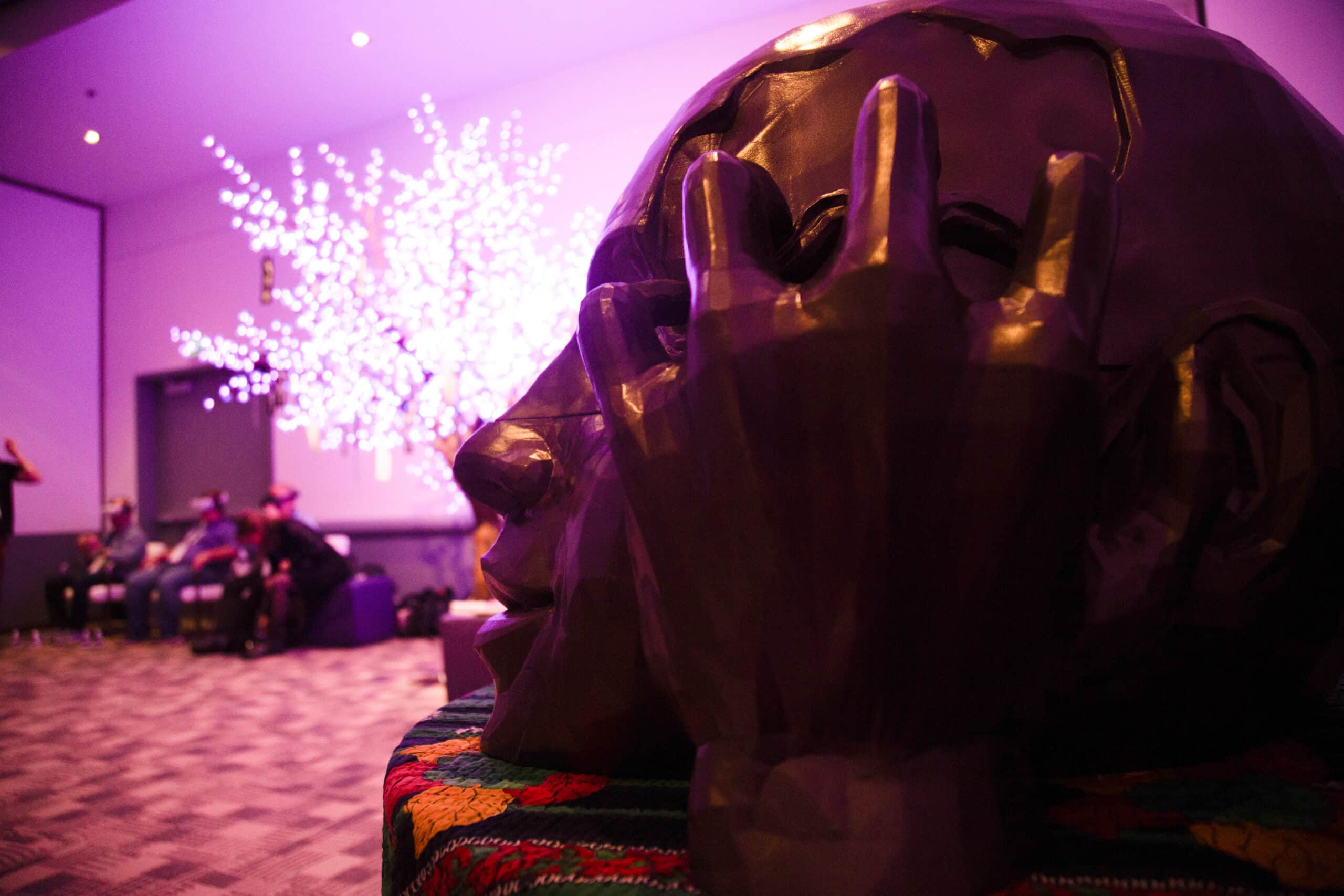
Naropa University, a renowned institution known for its integration of contemplative training and therapeutic disciplines, made a significant impact at the 2023 Psychedelic Science Conference in Denver late last month. Through a diverse range of events and offerings, Naropa University showcased its commitment to exploring the transformative healing potential of psychedelics and fostering a deeper understanding of the field.
Hosted by the Multidisciplinary Association for Psychedelic Studies (MAPS), the 5-day conference was the largest psychedelic conference in history with 12,000 attendees. Naropa’s Center for Psychedelic Studies joined the conference as an Associate Sponsor, and the university brought an array of students, staff, faculty, and alumnx to offer a taste of Naropa to conference participants. From official workshops on ‘Meditation and Contemplative Science for Psychedelic Practitioners’ to spontaneous ukulele concerts in the corridors, the Naropa community infused the conference with a unique blend of academic rigor and creative expression.
A university’s presence at a psychedelic conference was perplexing to some. Director of Mission, Culture, and Inclusivity at Naropa, Seann Goodman, said an attendee asked, “Naropa University—what is this, some kind of psychedelic school?” The answer is both yes and no.
Naropa University’s origins are closely intertwined with prominent figures from the early psychedelic era. The institution was founded by an exiled Tibetan lama, Chögyam Trungpa Rinpoche, who invited faculty like spiritual teacher Ram Dass (who had previously been Timothy Leary’s colleague at Harvard), beat poet Allen Ginsberg, and psychiatrist and psychedelic researcher Stanislav Grof to teach in the early years. Naropa, in a way, absorbed the energy and spirit of the psychedelic era and sought to construct an institution grounded in the integration of Eastern and Western wisdom, emphasizing social change and personal insight as core principles.
Goodman explains that because of this history, “Naropa is positioned at this time as a leader of contemplative education in the psychedelic space, while the rest of the higher ed landscape is now trying to catch up to something we have known about since our inception in 1974. It’s the perfect coherence of our countercultural non-linear lineage having been fully baked and ready for what Naropa alumnx and policy advocate, Matthew Duffy describes as the moment when, ‘counterculture becomes over the counterculture,’ in this new psychedelic wave.”
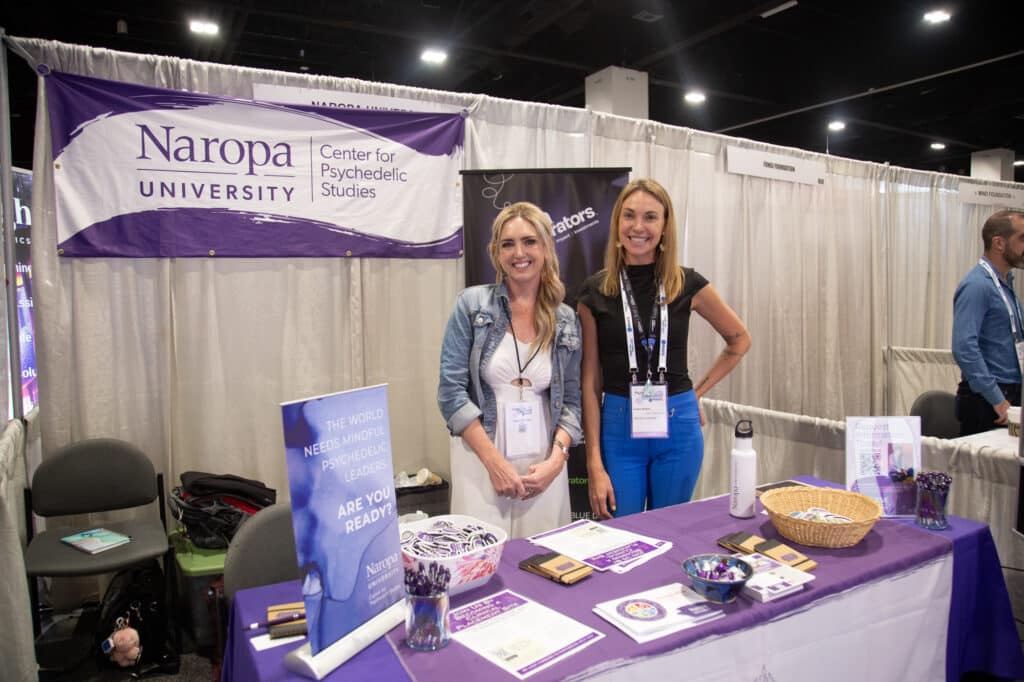
The first two days of the conference offered various public education opportunities hosted by the Naropa Center for Psychedelic Studies. These initiatives focused on exploring the transformative healing potential within the emerging field of psychedelic studies. Naropa’s integration of contemplative training with counseling psychology, chaplaincy, and ecopsychology uniquely positions the university to contribute to this expanding field.
One of the notable offerings from the Center for Psychedelic Studies was the Ecopsychedelic Practices for Addressing Eco/Social Crises workshop. Led by Azul DelGrasso, PhDc and Naropa faculty members Michal (Miki) Fire, PsyD, and Travis Cox, PhD, this workshop explored the intersection of ecopsychology and psychedelics. Participants had the opportunity to delve into practices that aimed to address environmental justice, eco-anxiety/trauma, and foster innovative solutions to global ecological and social challenges.
Another noteworthy session was the Psychedelic Care for Religious and Spiritual Care Professionals. Featuring Belinda Eriacho, Joe Tafur, and Moana Meadow, this session focused on the intersection of science, religion, and spirituality within the context of psychedelic-assisted therapy. Participants explored spiritually-integrated psychedelic therapies and how they can meet the needs of clients and their respective religious and spiritual communities.
Naropa University also made significant contributions through panel discussions and presentations. These included discussions on the suitability of psychedelic practitioners, increasing safety and participation in psychedelic research and communities among marginalized populations, and an overview of state psychedelic projects.
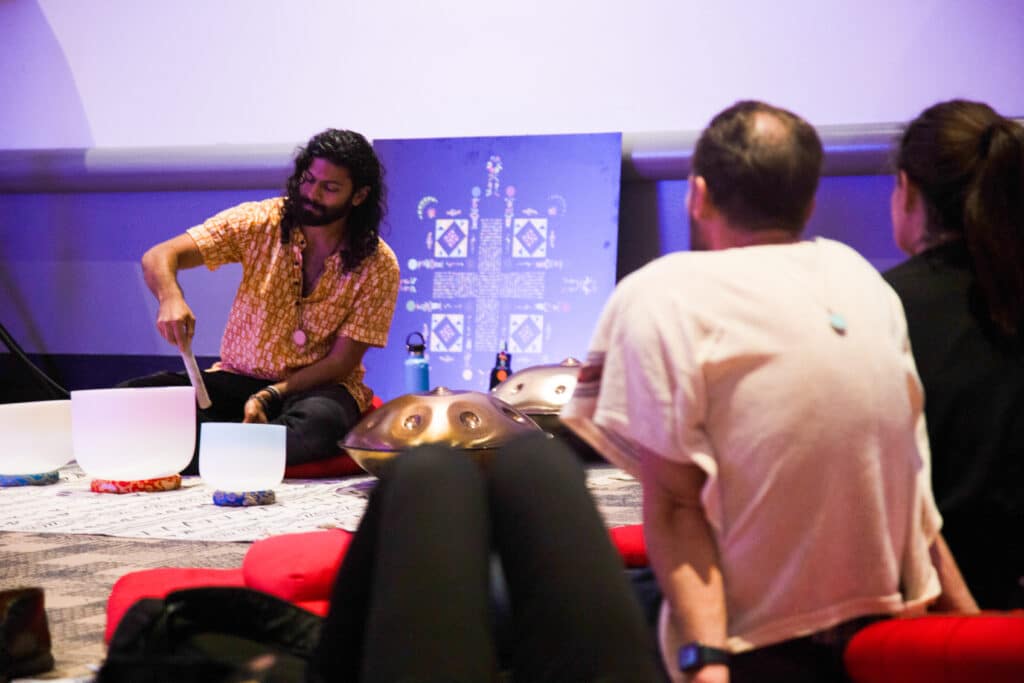
The third day of the conference marked the start of Naropa’s Dharma Play—an immersive journey filled with afro-futurist rituals, activities, elemental altars, sacred space, and sensory perception games. A troupe of contemplative space holders created a sense of wonder and joy in an area known as Deep Space (sponsored by Dr. Bronner’s), which offered a festival-like atmosphere, capturing the vibrant essence of contemporary psychedelic culture in full bloom.
“The intention of creating this mycelial-shaped experience was to position Naropa as the Contemplative Heart of Psychedelics,” states Monera Mason, Community Manager at Naropa, who was the Creative Director and Playwright for many of Naropa’s offerings at the conference. “We weaved together cultural narratives, Naropa’s lineage, Naropa’s mission and culture, her prankster lineage, all the future-ancestors. Dharma Play asked people to join the Naropians in creating a sense of belonging through the gift of a gem and greeting—tender hearts.”
The third day of the conference also signaled the opening of Naropa’s Contemplative Sacred Space. One half of the space contained a lounge and centered around a ‘Perception Tree’ from Unlikely Collaborators, which invited visitors to answer a consequential and contradictory question about how they see themselves and hang it from the tree’s branches. Also in the lounge was a sculpture of Headmaze. Originally installed at Burning Man, the sculpture of a meditating head is dedicated to the complexities of the subconscious that we all wrestle with.
The other half of the space contained a meditation hall, complete with Naropa’s own meditation cushions, providing a refuge from the hustle and bustle of the conference, with an altar built by Ceremonia (a psychedelic retreat center in CO). Staffed by a team of chaplains drawn from the university’s student body and employees, the space provided an intimate, contemplative space to deepen human connection with self and others in the midst of the widely freewheeling atmosphere of the conference. Manager of Strategic Initiatives at Naropa, Joseph Grobelny, ran project management for the Naropa teams at the conference and recalled the first person to drop by in the morning on Wednesday was a Naropa alumnx who “felt like they were back [on campus] in Shambhala Hall.”
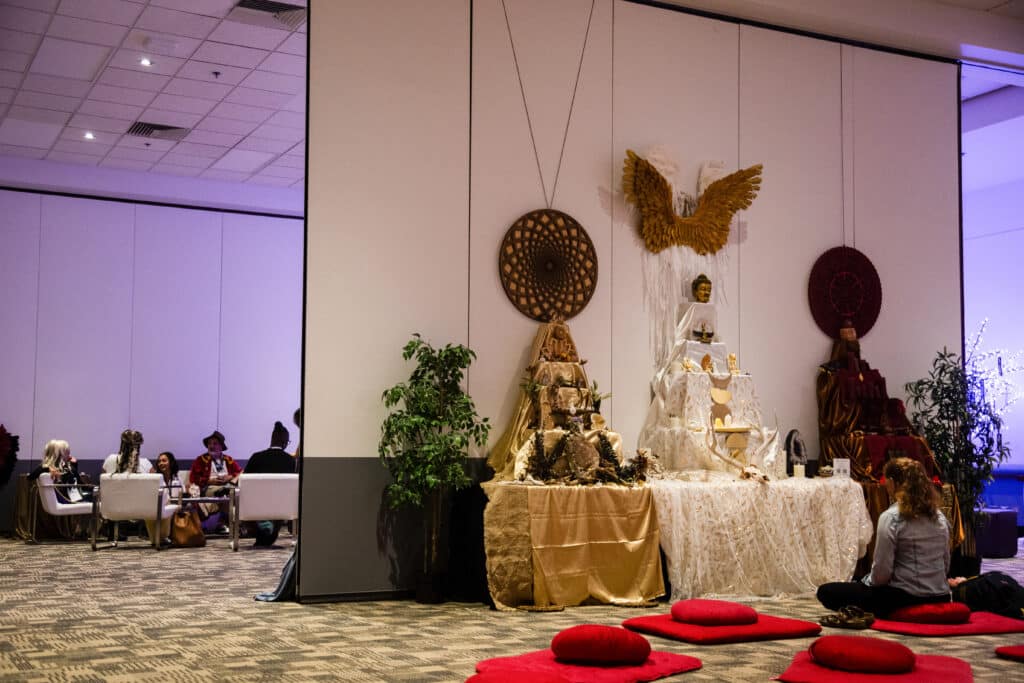
The Dharma Play activities commenced with a yoga session led by Gabrial Reising on the Deep Space Stage, giving attendees the opportunity to start their day in a mindful and energizing way and setting a positive tone for the rest of the conference.
Rutury Temay, a traditional Wixarika (Huichol) medicine person and co-founder of Ancient Springs, shared insights and wisdom from their community in an Indigenous Story Hour. Ancient Springs, a nonprofit organization, aims to serve both tribal and non-tribal communities through counseling services, educational programs, and workshops. Attendees were privileged to witness the rich cultural heritage and healing practices of the Wixarika people.
Naropa then hosted the Opening Ritual: Socio-Celestial Mapping and Living Mandalas, facilitated by Naropa faculty member Ramon Parish and produced by Seann Goodman. The ceremony utilized the lens of tropical astrology and modalities of creativity, spoken word, embodiment, and collective strategizing/participation. Participants joined an ensemble cast of Naropians to co-create a ceremony that awakened and grounded symbolic and archetypal energies, acting as a gateway to the conference.
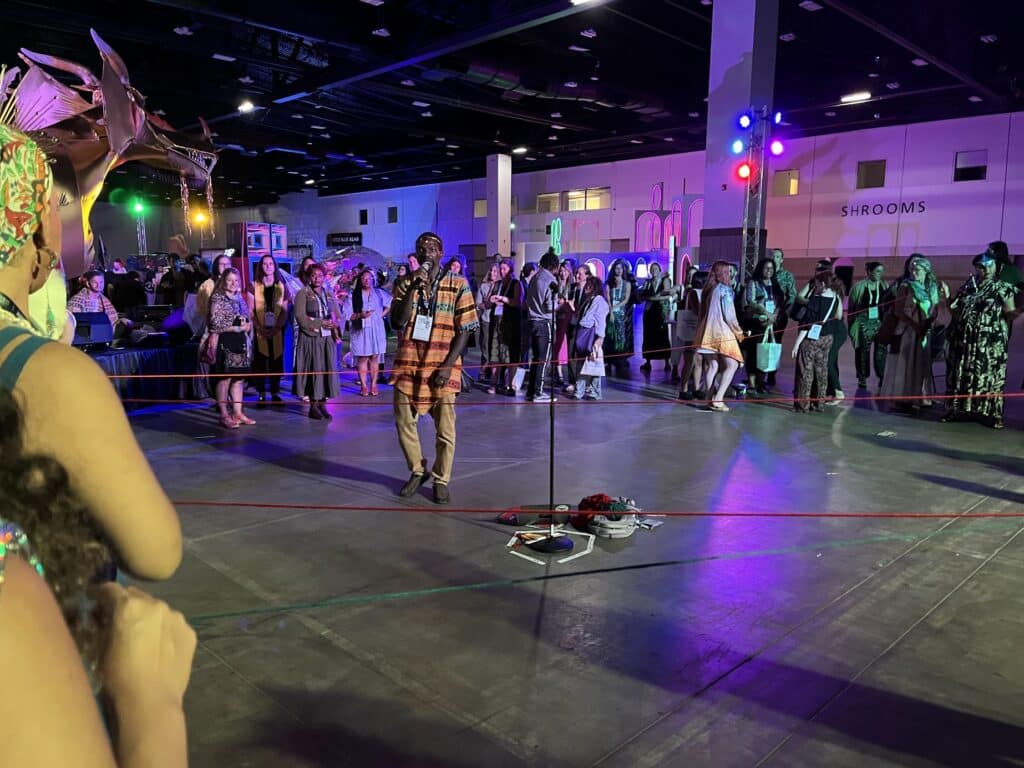
During the lunch hour, attendees were invited to the High Noon Parallel RealiTEA Party in the Tea Lounge at Deep Space. Facilitated by King Lexie, this immersive tea party encouraged participants to embody parallel versions of themselves and engage in spontaneous play. It provided a unique opportunity for attendees to connect with others and explore alternate versions of their identities.
Goodman explains, “Our offerings on the MAPS x Dr. Bronners Deep Space stage provided room for imagination, celestial mandalas, time travel, plant spirit channeling, honoring our grief and pain, and liberating attendees with actions of justice, equity, diversity, and inclusion. In the space of biotech research, big pharma, and the scramble by small business to cash in, Naropa cashed in at MAPS in celebration of our creative capacities, interconnections, and uplifting the weirdness meter good vibes. New partners, networks, and friendships are just the tip of the impact that Naropa’s presence made at MAPS PS23.”
A highlight of Naropa University’s involvement was the Channeling Plant Wisdom in an Afro-future: An Interspecies Galactic Council in the Contemplative Space. Facilitated by Ramon Parish and Regina Smith, Vice President of Mission Culture, & Inclusive Community at Naropa. This ritual emerged from Joanna Macy’s Work that Reconnects and invited participants to channel the voices of plant elders. Attendees had the opportunity to listen to their wisdom as they offered guidance from the future, shedding light on human disconnection, the gifts plants are willing to share, and what interspecies liberation might look like in the year 2399.
These events were designed as “interactive offerings that evoked alternative temporalities, the possibilities of interspecies communication, and futures rooted in the experiences of peoples of the global majority, all keys to the wisdom embodied by mature psychedelic cultures,” explains Parish. “The conference was a unique opportunity for students, faculty, alumnx, staff, and community members to co-create and to take Naropa’s particular magic into a public forum of national prominence.”
The day concluded with the Sub-Atomic Spaces: A Plant Wisdom Oasis Ceremony on the Deep Space Stage. Facilitated by multidisciplinary artists TRENETI & FAERY, with a tribute to Kilindi Iyi, this immersive musical experience featured original regenerative music, channeled sound healing transmissions, and restorative plant frequencies. Inspired by the late Kilindi Iyi, a prominent African American voice in the psychedelic community, this ceremony aimed to nourish the soul and provide a transformative journey for participants.
The next day, Naropa offered another series of thought-provoking events that left attendees inspired and introspective. Director of Sustainability at Naropa, Michael Bauer, and Naropa student Rachel Fryke led an “Honoring Our Pain for the World” session in Deep Space. The somber tone of the grief ritual was held by the tree-bearing gatekeepers who held the circle where the water was centered. Participants were invited to hold their grief in a stone and then to let the stone drop onto the communal vessel as a steady drum beat marked each person’s pain. Acknowledging the deep concern many feel for the state of our world, the session aimed to move beyond disempowerment and grief by creating a new narrative. When it came time to bring the water to the creek, a hail storm warning kept everyone inside mourning with the torrential weather.
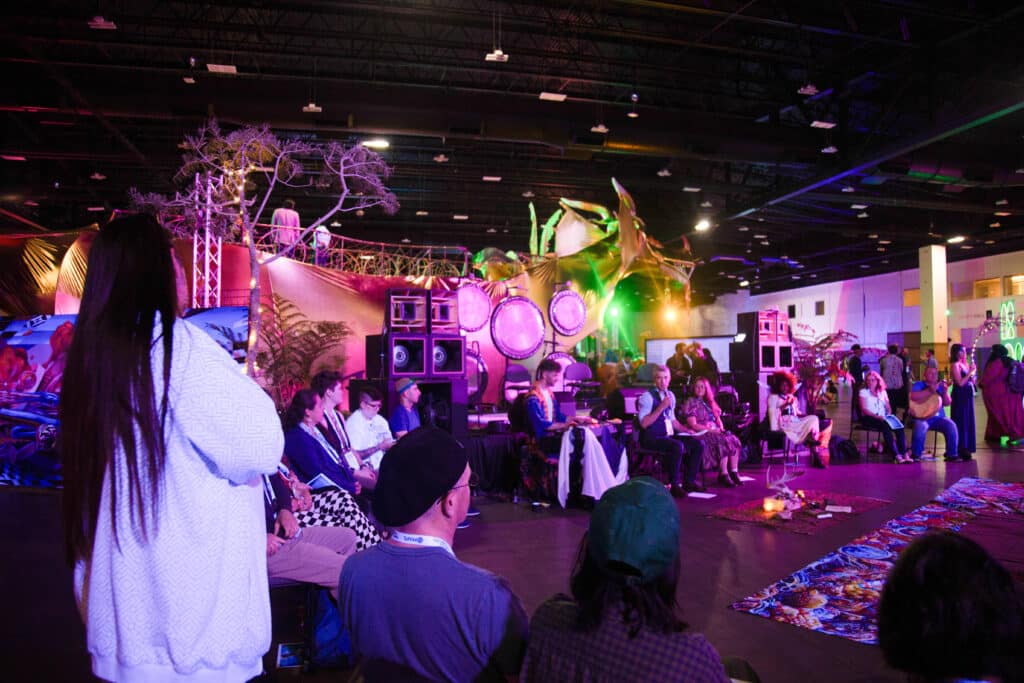
The Naropa Contemplative Space then became a hub of insightful discussion in a session titled “Ram Dass: Loving-Awareness Meets Psychedelic Insight.” Facilitated by Raghu Markus, Danielle Ananda Krettek, and Gagan Levy, the event explored the integration of insights gained from psychedelic exploration with the profound nature of loving awareness. East Forest brought music into the intimate setting and guests had the opportunity to meditate with Ram Dass via Tripp’s VR Experience. Ram Dass’s teachings provided a guiding light in navigating the depths of our true selves, where the essence of loving awareness resides.
The Heart Opening Activation Play, facilitated by Naropa faculty member Brigitte Mars and eco-conscious hip-hop musician Bethy LoveLight, invited attendees to engage in a holistic practice incorporating sound, color, aroma, movement, and intention. Through this embodied approach, participants accessed a state of heart-centeredness, fostering emotional openness, and connection. It was a playful and transformative experience that encouraged individuals to embrace their authentic selves.
The closing moments of the conference were marked by a powerful Closing Sound Ceremony led by Naropa faculty members, Sheela Bringi and Brent Kuecker. Through the resonance of sacred sounds, participants were invited to honor the transformative journey they had embarked upon during the conference. The ceremony created a space for integration, closure, and deepening connections among the attendees.
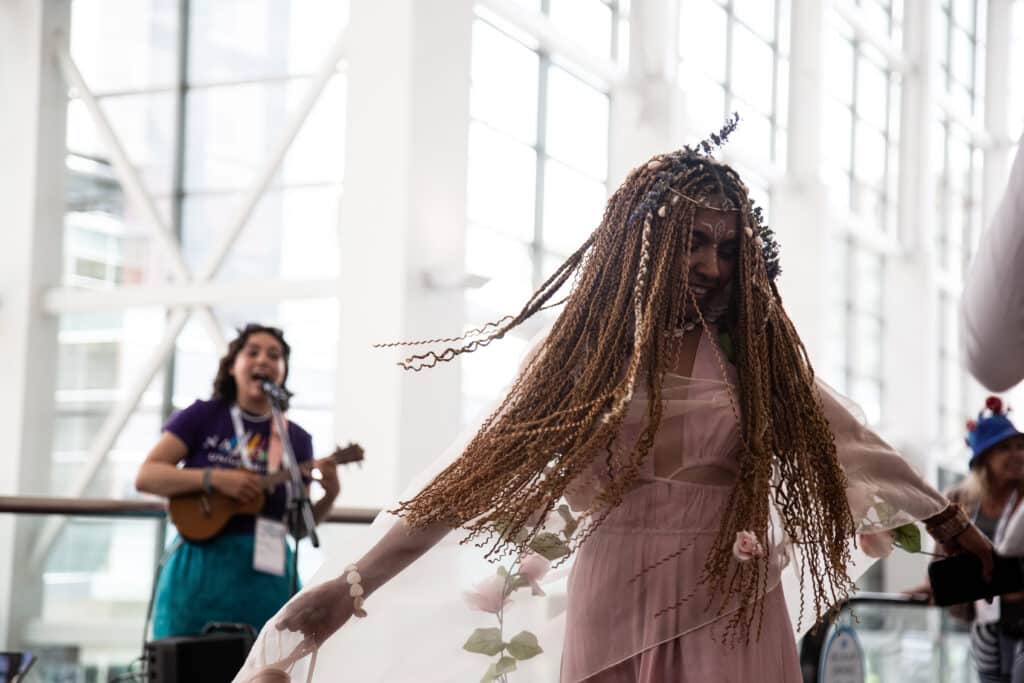
“The MAPS Psychedelic Science conference was a mile marker in the contemporary psychedelic timeline, explained Joseph Harrison, Executive Director of the Naropa Center for Psychedelic Studies. “For Naropa University and the Center for Psychedelic Studies (NCPS), this was our public launch into the psychedelic space. While I left the event feeling optimistic about the possibilities, I know that there is room for improvement, particularly in the representation of underserved groups (e.g., Black, Indigenous, and People of Color). I am very proud that the NCPS is dedicated to addressing these shortcomings in all aspects of its programming. If there was one post-conference feeling that I am left with, it is gratitude, for all the Naropa students, staff, faculty, and friends who put so much of their own time, creativity, and heart into making sure that Naropa was visibly and positively represented.”
Overall, Naropa University’s involvement in the 2023 Psychedelic Science Conference offered a tapestry of diverse experiences, embracing indigenous wisdom, sound healing, heart activation, and communal ceremony. Attendees were fortunate to engage with esteemed facilitators who guided them on profound inner journeys, fostering connection, self-discovery, and holistic well-being. These collaborations between Naropa and MAPS provided a space for contemplation, growth, and the unearthing of new perspectives on psychedelics and their role in personal and collective transformation.
Additional Resources on Psychedelics from Naropa:
Mindful U Podcast Episodes
- Valeria McCarroll, PhD: Somadelics, Pursuing Life with Psychedelic Support & Intentional Integration
- Dr. Nicholas Powers: A Future On Psychedelics
- Spring Washam: Ayahuasca’s Accelerated Earth School
- Travis Cox: Ecopsychology and Psychedelics
- Jamie Beachy: Psychedelic Chaplaincy
Psychedelic Alchemy Speaker Series
- Somatic Therapist and Teacher Valeria McCarroll PhD, LMFT – Are psychedelics doomed to be tools of oppression, or can they be agents of liberation?
- Author and Journalist Erik Davis, PhD – Alchemy of Modernity
- Professor and Poet Nicholas Powers, PhD – Flowers in Gun Barrels: How the Psychedelic Renaissance Can Stop War
- Dharma Teacher and Shamanic Practitioner Spring Washam – Buddhism & Plant-Based Medicine
Photos by Crystal Street


